Schizophrenia-related behaviors were induced in mice through the administration of anti-NRXN1α autoantibodies taken from schizophrenia patients.

Analyzing schizophrenia - related phenotypes in mice caused by autoantibodies against NRXN1α in schizophrenia
Go to source). In this study, links have been reported between schizophrenia and proteins produced by the immune system that can act against one’s own body, known as autoantibodies in mice.
How is Synaptic Protein in Brain Linked to Schizophrenia?
Synaptic adhesion proteins are specialized proteins that bind to create physical connections between brain cells. These connections, called synapses, allow the cells to communicate by passing molecules back and forth.‘Removal of anti-NRXN1α autoantibodies may be a therapeutic target for a subgroup of Schizophrenia patients who are positive for these autoantibodies.#Schizophrenia #autoimmunity #Autoimmune psychosis’





Both synapses and autoimmunity are known to be associated with schizophrenia (2✔ ✔Trusted SourceThe Role of Brain-Reactive Autoantibodies in Brain Pathology and Cognitive Impairment
Go to source), so the research team from Tokyo Medical and Dental University (TMDU) decided to investigate autoantibodies that target synaptic proteins in patients with schizophrenia.
In around 2% of the patient population, researchers have identified autoantibodies against the synaptic protein neurexin 1α, which is expressed by one cell in the synapse and binds to proteins known as neuroligins in the other cell in the synapse. After identifying these autoantibodies, they wanted to see if these proteins were able to cause schizophrenia-related changes.
To know this, they isolated autoantibodies from some of the patients with schizophrenia and injected them into the cerebrospinal fluid of mice, so that the autoantibodies would travel into the brain.
In these mice, the autoantibodies blocked neurexin 1α and neuroligin binding and altered some related synaptic properties. The administration of these autoantibodies also resulted in fewer synapses in the brains of mice and schizophrenia-related behaviors, such as reduced social behavior toward unfamiliar mice and reduced cognitive function.
Targeting Autoantibodies Against Synaptic Protein: New Option in Schizophrenia Treatment
Together, these results strongly suggest that autoantibodies against neurexin 1α can cause schizophrenia-related changes, at least in mice. These autoantibodies may therefore represent a therapeutic target for a subset of patients with schizophrenia (3✔ ✔Trusted SourceNeurexins in autism and schizophrenia-a review of patient mutations, mouse models and potential future directions
Go to source).
Schizophrenia has a wide variety of both symptoms and treatment responses, and many patients have symptoms that are resistant to currently available treatment options. Therefore, the identification of possible disease-causing autoantibodies is important for improving symptom control in patients with schizophrenia.
Advertisement
References:
- Analyzing schizophrenia-related phenotypes in mice caused by autoantibodies against NRXN1α in schizophrenia - (https://www.sciencedirect.com/science/article/pii/S0889159123000855?via%3Dihub)
- The Role of Brain-Reactive Autoantibodies in Brain Pathology and Cognitive Impairment - (https://www.frontiersin.org/articles/10.3389/fimmu.2017.01101/full)
- Neurexins in autism and schizophrenia—a review of patient mutations, mouse models and potential future directions - (https://www.nature.com/articles/s41380-020-00944-8)
Source-Eurekalert












